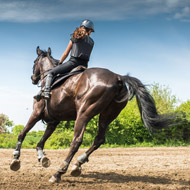
Researchers assess how different riding styles influence movement symmetry
Researchers at the University of Uppsala, Sweden, and the RVC have published new research that considers how different seating styles influence a horse’s movement symmetry.
The article, published in the journal PLOS One, presents results of research concerning horse-rider interactions. It is hoped the results will help riders identify the early signs of lameness and aid vets in the correct identification of the lame limb.
Bio-engineering lecturer Dr Thilo Pfau of the RVC said: “Equine gait analysis has undergone a recent transformation from a purely lab-based science to a practical tool that can be applied to analysing the movement of horses doing ‘everyday tasks’, such as exercise under the rider.
“This transformation has been driven by progress in sensor and wireless technology, and PhD students in this field often benefit from a multi-disciplinary team of supervisors. The complementary skill sets of the team from Uppsala and the RVC Structure and Motion Lab is one successful example of this multi-disciplinary approach.”
In the study, researchers used inertial sensors to assess how different riding styles influence a horse’s head and pelvic movement symmetry. The horses trotted in straight lines, lunged and were ridden in circles in both directions.
The team assessed 15 different trot conditions in a total of 26 horses. These included three unridden conditions and 12 ridden conditions, where the rider performed three different seating styles - using trot, sitting trot and two-point seat.
They found that the rising trot induced systematic changes in movement symmetry. Most obvious was decreased pelvic rise that occurred as the rider was actively riding up and down in stirrups, creating a downward movement counteracting the horse’s push off.
“It is our hope that the results of this study will aid riders and trainers in early detection of lameness and veterinarians in the correct identification of the lame limb," explained lead author Emma Persson-Sjodin of the University of Uppsala. "A timely recognition and a correct diagnosis is essential for appropriate treatment and a good prognosis avoiding further progression into chronic orthopaedic disease.
She added: "Improvements in lameness detection and diagnosis will lead to improved welfare and increased longevity of our horses which is a general aim of our research group.”



 The latest
The latest